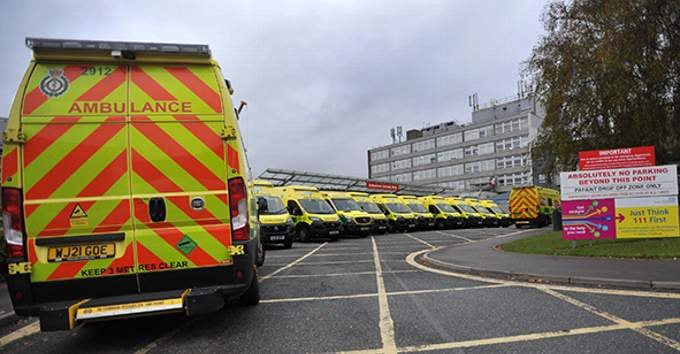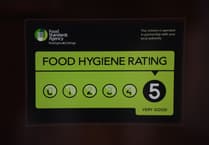A PARAMEDIC from Teignbridge has described the desperate situation facing the ambulance service.
The medic, who has asked to remain anonymous, believes people are dying because of the lengthy waiting times and the backlog of ambulances waiting to take patients into accident and emergency at Torbay Hospital.
One eye witness attending an outpatient appointment counted 16 ambulances and ambulance cars piled up outside accident and emergency, two were parked on the pavement outside the main entrance and a further three parked outside the Hetherington Unit directly opposite.
Teignmouth county councillor David Cox says he thinks people are dying because the hospital can’t take people in.
He has been told that waiting times at the hospital are on average three to six hours in the ambulance outside and then further waiting time inside the emergency department.
Meanwhile, ambulance crews are tied up outside waiting to take patients inside, preventing them from attending other potentially emergency calls.
The paramedic explained: ‘This ties up around eight to 10 of the ambulances from this area at one time stopping them from going out to people that need them.
‘When we take a patient to hospital we don’t have to wait with them until there is space in the hospital to receive them but it’s our duty of care to do so.
‘The hospital is not providing staff or anywhere for these patients to safely wait.
‘So the ambulance service is taking it upon themselves to provide this as duty of care to the patients that they are seeing.
‘This is the reason I believe people are dying along with the fact that GPs are not seeing people face-to-face, the public is not able to get through to the GP surgery over the phone as telephone waiting times are very long and people are giving up and calling 111 or 999.’
The paramedic said GPs were speaking to patients over the phone but then directing them to the hospital or to call an ambulance when this potentially may not have been necessary.
This is adding strain to the ambulance service and mental strain onto staff.
Many staff are said to be suffering and off sick with mental health issues.
There is claimed to be an issue with so-called bed blocking as there are few places to discharge patients from Torbay Hospital.
Dawlish, Totnes and Newton Abbot hospitals are locations patients can be discharged to before returning home.
But social care is said to be ‘lacking’ which means Torbay Hospital has to keep patients in as it is considered unsafe to discharge them.
The paramedic added: ‘It is quite soul destroying to spend six hours sat in an ambulance outside A&E with a patient that you’ve rushed to get to in the first place and you’ve insisted they need to be in hospital.
‘And then to go to somebody that has been on the floor for hours in their own urine and haven’t eaten or drunk because we just couldn’t get to them.’
Highest ever demand for service
A SPOKESMAN for South Western Ambulance Service said: ‘We continue to experience the highest-ever level of sustained demand on our service.
‘Our response times are directly affected by the time it takes us to handover patients into busy hospital emergency departments, which is longer than we have ever seen before.
‘We are losing many more hours compared with recent years which causes our ambulances to queue outside hospitals and unable to respond to other patients and has an inevitable impact on the service we can provide.
‘This is a health system-wide problem which therefore, demands a system solution.
‘It is an absolute priority for us and our NHS partners to reduce these delays, so we can be there for our patients, while prioritising those who are most seriously injured and ill.
‘Patients who need urgent medical help or advice are encouraged to visit or to call 111, which is free and available 24/7.
‘This will ensure they get the right care, and the ambulance service can focus on those most in need.
‘For on-going or non-urgent medical concerns or if they need medicines, people should contact their local GP surgery or a local pharmacy.’
‘Under significant pressure’
A SPOKESMAN for Torbay and South Devon NHS Foundation Trust said: ‘Like most trusts, we have been under significant pressure during recent months with more people needing emergency treatment and an increase in prevalence of COVID-19 in our communities, our hospitals and our staff.
‘This has had an impact across our whole healthcare system with fewer beds available in our hospitals and in care homes and fewer care staff to support people at home.
‘This in turn makes it difficult to discharge people from hospital into the community or back home, and means that sometimes we are not able to offload ambulances as quickly as we would like.
‘In addition, sometimes patients being admitted to hospital from our emergency department will experience long waits before we can find a ward bed for them.’
‘Situation is now intolerable’
THE ambulance service in Devon and across the South West has ‘never experienced such a long period of sustained demand’ Jessica Cunningham, South Western Ambulance Service’s executive director of operations, told Devon’s health and adult care scrutiny.
The service had ‘broadly’ been at its highest level of ‘escalation’ since June and that total activity in Devon is 12 per cent higher than last year and nearly 20 per cent up on April this year.
A report to the committee described handover delays at hospitals as becoming ‘intolerable’, with the service ranking the worst in the country for the time taken. Ms Cunningham said delays were especially bad at Derriford and Torbay hospitals.
The report said: ‘We are currently losing around 750 hours per day to handover delays at hospital emergency departments, compared to around 400 hours per week two years ago. This results in many ambulances queuing outside hospitals, and unable to respond to other emergency calls.
‘These levels have become intolerable and it’s an absolute priority for us and for our NHS partners to reduce these delays, so crews can get back out on the road for other patients.’
The committee agreed to conduct a review on the pressures faced by the trust and its partners.




